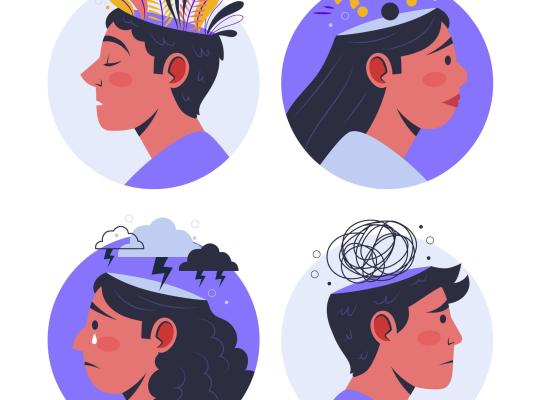
Online test
Find out the severity of your symptoms with this free online test
The Assessment of OCD: What To Expect
If you've been struggling with unwanted, intrusive thoughts or feel compelled to perform certain behaviors repeatedly, you might be wondering whether you have Obsessive Compulsive Disorder (OCD). Taking the step to seek an assessment is an important move toward understanding what you're experiencing and finding the right support.
But the idea of someone asking questions and having to share painful or personal information can feel intimidating or even a bit scary, especially if you’ve never done it before. Knowing what to expect during the assessment process can help ease some of the fear and anxiety that often comes with reaching out for help. Here we’re going to pull the curtain back on the assessment process so that you know what you can expect.
Understanding the Assessment Process
Getting an OCD assessment isn't as intimidating as it might sound. At its core, an assessment is really a structured conversation with a mental health professional who wants to understand your experiences, how they affect your daily life, and whether they align with OCD or perhaps something else. There’s no scary medical testing, no needles or bloodwork, and no trick questions. The goal is simply to get a clear picture of what you're going through so that you can get the care that is right for you.
The assessment typically begins with gathering background information about you. Your provider may ask about things like:
- Personal history such as medical and mental health history, your childhood, significant events in your life
- Family history, including whether anyone in your family has experienced anxiety disorders or OCD
- Your symptoms, when they first started and how they've progressed over time
- What impact your symptoms are having on your work, relationships, and overall quality of life
A key part of an assessment for OCD focuses on understanding your specific experiences with obsessions and compulsions. Your provider will ask detailed questions about these experiences to understand their nature, frequency, and the distress they cause.
Don't be surprised if the assessment feels thorough. That’s a good thing. Your provider isn’t looking for “gotcha” moments. They’re trying to distinguish OCD from other conditions that can look similar, such as generalized anxiety disorder, health anxiety, eating disorders, or certain aspects of autism spectrum disorder. They'll also want to rule out any medical conditions or medications that might be contributing to your symptoms. And sometimes, it’s those tiniest details that distinguish one diagnosis from another. It’s a process clinically known as differential diagnosis.
Who Can Conduct an OCD Assessment?
Several types of mental health professionals are qualified to assess and diagnose OCD, each bringing their own strengths and expertise. Understanding who these providers are can help you make informed decisions about where to seek help.
- Psychiatrists are medical doctors who specialize in the treatment of mental disorders. They can conduct comprehensive assessments, make diagnoses, and prescribe medication if needed. Some psychiatrists include therapy as part of their practice, but not all do.
- Psychologists typically hold doctoral degrees in psychology and are trained in assessment, diagnosis, and treatment of mental disorders. Many psychologists have specialized training in the assessment and treatment of OCD. They can conduct thorough diagnostic evaluations but cannot prescribe medication (except in a few states in the US with special certification).
- Licensed clinical social workers, licensed professional counselors, licensed marriage and family therapists may also conduct OCD assessments, depending on their training and state regulations. Many of these professionals have specialized training in OCD and can provide excellent diagnostic and treatment services.
While you may have a lot of different providers to choose from, expertise matters. When seeking an assessment, it's important to look for a provider who has specific experience with OCD.
The Clinical Interview: What You'll Discuss
The heart of an OCD assessment is the clinical interview, aka “more questions”. This is where your provider will ask you specific questions about your experiences. While every assessment is somewhat unique, there are certain areas that will likely be covered.
Your provider will want to understand the nature of your obsessions. These might include fears about contamination, concerns about harm coming to yourself or others, a need for things to be symmetrical or "just right," unwanted sexual or religious thoughts, or fears about losing control. It's important to be as honest as possible, even if your thoughts feel embarrassing or disturbing. Remember, your provider has heard it all before and won't judge you. They’re there to help.
Your provider will also want to explore your compulsions, which might include visible behaviors like excessive washing, checking, ordering, or counting, as well as mental compulsions like silent praying, mental reviewing, or seeking reassurance. Your provider will want to know how much time these behaviors take up in your day and how difficult it is to resist them.
A crucial part of the assessment involves understanding how OCD affects your functioning. You might be asked things like:
- Do your symptoms interfere with work or school? If so, how?
- Have your symptoms impacted your relationships?
- Are there places you avoid or activities you no longer do because of your symptoms?
This information helps your provider understand the severity of your symptoms and the level of care you might need. Here’s a pro tip: Jot down pertinent information about your symptoms that you want your provider to know. Being in the therapy room can feel overwhelming and having a list can help you remember to share the things you want to share.
The Role of OCD Screening Tools
You may encounter OCD screening tools as part of your assessment journey, or maybe you’ve come across them online before you seek professional help. While these tools can be helpful, it’s important to understand what they are and what they are not.
Screening tools are just that. They are tools, usually in the form of a questionnaire, designed to determine whether someone might have OCD and possibly benefit from a full assessment.
Your provider may, as part of their assessment process, utilize one or more of these screening tools in order to add to the information being gathered. Some of the more common screening tools include:
- Obsessive-Compulsive Inventory (OCI)
- Yale-Brown Obsessive Compulsive Scale (Y-BOCS)
- Florida Obsessive-Compulsive Inventory (FOCI)
Screening tools, whether done on your own or as part of your provider’s assessment process, can be genuinely helpful:
- They can help you organize your thoughts about your symptoms before meeting with a provider
- They can give you language to describe what you're experiencing
- If you take one online and score high, it might give you the validation you need to seek professional help
- If you're already in treatment, these tools can help track your progress over time.
While screenings are useful, it is important to know that screening tools are not diagnostic instruments. A high score on a screening tool does not mean you definitely have OCD, just as a low score doesn't rule it out. They can be a helpful first step, but not the deciding factor.
Screening tools are kind of like your tire pressure light. When it goes on, it doesn’t tell you why. It could mean a major problem like a flat, or just that your tire pressure is a little low and it needs air. It’s simply a conveyer of information.
If you've taken a screening tool and your results suggest OCD might be a concern, the appropriate next step is to schedule an assessment with a qualified mental health professional. While it might be tempting, don’t try to self-diagnose or self-treat based solely on screening results. Bring your screening results to your appointment but let your provider’s assessment guide your decisions.
What Happens After the Assessment?
Once your assessment is complete, your provider should give you clear feedback about their findings. If you meet the criteria for OCD, they'll explain this diagnosis to you and discuss what it means. They should also talk with you about treatment options, which typically include therapy, most likely Exposure and Response Prevention (ERP), a specialized form of Cognitive Behavioral Therapy (CBT), which is considered the gold standard treatment for OCD, medication, or a combination of both.
What happens if your assessment doesn’t reveal OCD? If your symptoms don't quite meet the criteria for OCD, that doesn't mean your struggles aren't real or important. Your provider can still offer guidance about what might be going on and what steps you can take to feel better. Sometimes people have some OCD features but not the full disorder, or they might have a different anxiety condition that requires a different treatment approach. The post-assessment conversation is a key part of determining what happens next.
Preparing for Your Assessment
You can do a lot to prepare for your assessment. You’ll likely be nervous and trying to remember everything you want to tell your provider can be difficult in the moment. Here are some tips to help you be prepared and confident:
- Consider keeping a brief journal of your symptoms for a week or two before your appointment. Note what obsessive thoughts you experience, what compulsive behaviors you engage in, and how much time you spend on these activities. This can help you provide concrete examples during your assessment.
- Jot down any specific questions you want to be sure to ask when you meet with your provider.
- Try to be as open and honest as possible, even when discussing thoughts or behaviors that feel embarrassing. Your provider needs accurate information to help you, and rest assured, they are legally and ethically bound by strict confidentiality standards.
- Finally, if there's something you don't understand about the assessment process, the diagnosis, or the next steps, speak up. You are a partner in this process. A good provider will be happy to explain and ensure you feel informed and empowered in your care.
Remember that getting an assessment is a sign of strength, not weakness. OCD is a treatable condition, and accurate diagnosis is the first step toward effective treatment. Most people with OCD who engage in appropriate treatment experience significant improvement in their symptoms and quality of life.
Are you wondering if your symptoms might be OCD? StopOCD offers a free online screening to determine whether your symptoms might be signs of OCD. StopOCD also offers resources and support as well as access to online therapy with expert therapists who use the best in evidence-based approaches to treat OCD.
While it may feel daunting, taking action to understand and address your symptoms is a powerful first step and that’s something to feel good about.
References
Online test
Find out the severity of your symptoms with this free online test
Start your journey with StopOCD
Take control of your life and find freedom from OCD through professional therapy and evidence-based cognitive behavioral techniques.
Start Now



